最新版PEP小学英语毕业总复习资料
最新人教pep版小学英语毕业专项复习——第四部分 时态精析 第五节一般过去时
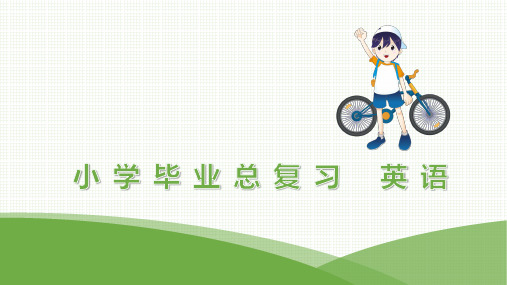
3. A: There was a great game on TV. ___D_i_d_y_o_u__w__a_tc_h__th_e__g_a_m__e?___________
B: No, I didn't. I was sick (生病的) and slept early. 4. A: __D_i_d__y_o_u_s_t_a_y_a_t_h_o_m__e_a_n__d_w__a_tc_h__T_V__y_e_s_te_r_d_a_y_?___ B: Yes, I stayed at home and watched TV yesterday.
返回目录
三、一般过去时的句型结构 1. 肯定句: (1)主语+was/were+其他。如: I was at home last night. 昨天晚上我在家。 (2)主语+动词的过去式+其他。如: They went to the park last weekend. 上个周末他们去了公园。
返回目录
返回目录
4. What ___d_id_____ you ____d_o_____ (do) the day before yesterday? 5. Last week, we ___p_ic_k_e_d___ (pick) many apples on the farm. 6. My mother __d_id__n_'t_d__o_ (not do) housework yesterday.
第二篇 专项提升
返回目录
第四部分
时态精析
第五节 一般过去时
知识梳理 一、一般过去时的用法 一般过去时表示在过去的某个时间内发生的动作或存在 的状态。 时间标志词:yesterday, yesterday+ morning/afternoon/evening, last+night/week/year, ago, before, the day before yesterday, just now等。如: I went to the supermarket yesterday. 昨天我去了超市。
PEP人教版小学六年级毕业班英语复习资料(三至六年级)
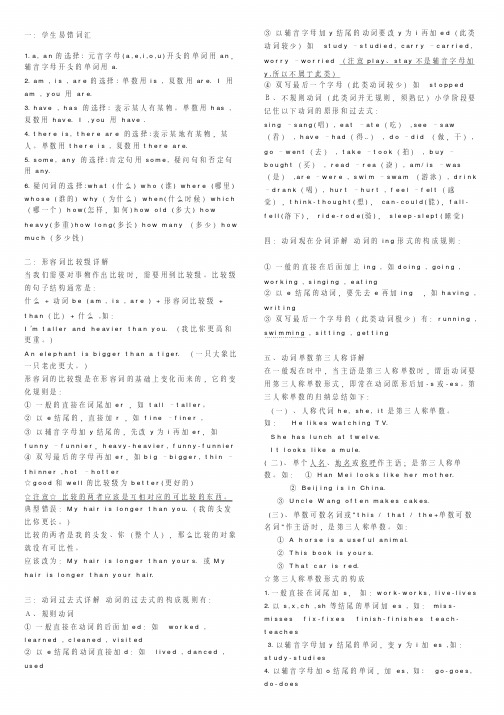
一:学生易错词汇1.a,a n的选择:元音字母(a,e,i,o,u)开头的单词用a n,辅音字母开头的单词用 a.2.a m,i s,a r e的选择:单数用i s,复数用ar e.I用a m,y o u用a r e.3.h a v e,h a s的选择:表示某人有某物。
单数用h as,复数用h a v e.I,y ou用h a v e .4.t h e r e i s,t h e r e a r e的选择:表示某地有某物,某人。
单数用t h e r e i s,复数用t h e r e a r e.5.s o m e,a n y的选择:肯定句用s o m e,疑问句和否定句用a n y.6.疑问词的选择:w h a t(什么)w h o(谁)w h e r e(哪里) w h o s e(谁的)w h y(为什么)w h e n(什么时候)w h i c h (哪一个)h o w(怎样,如何)h o w o l d(多大)h o wh e a v y(多重)h o w l o n g(多长)h o w m a n y(多少)h o w m u c h(多少钱)二:形容词比较级详解当我们需要对事物作出比较时,需要用到比较级。
比较级的句子结构通常是:什么+动词b e(a m,i s,a r e)+形容词比较级+t h a n(比)+什么,如:I’m t a l l e r a n d h e av i e r t h a n y o u.(我比你更高和更重。
)A n e l e p h an t i s b i g g e r t h a n a t i g e r.(一只大象比一只老虎更大。
)形容词的比较级是在形容词的基础上变化而来的,它的变化规则是:①一般的直接在词尾加e r,如t a l l–t a l l e r。
②以e结尾的,直接加r,如f i n e–f i n e r,③以辅音字母加y结尾的,先改y为i再加e r,如f u n n y–f u n n i e r,h e a v y-h e a v i e r,f u n n y-f u n n i e r④双写最后的字母再加e r,如b i g–b i g g e r,t h i n–t h i n n e r,h o t–h o t t e r☆g o o d和w e l l的比较级为b e t t e r(更好的)☆注意☆比较的两者应该是互相对应的可比较的东西。
小学PEP英语毕业总复习之各册知识点

PEP小学英语毕业总复习各册知识点三年级上册重点单词pen (钢笔) pencil (铅笔) pencil-case ( 铅笔盒) ruler(尺子) eraser(橡皮) crayon (蜡笔) book (书) bag (书包) sharpener (卷笔刀) school (学校)head (头) face( 脸) nose (鼻子) mouth (嘴) eye (眼睛) leg (腿) ear (耳朵) arm (胳膊) finger (手指) leg (腿) foot (脚) body (身体)red (红色的) yellow (黄色的) green (绿色的) blue (蓝色的) purple (紫色的) white (白色的) black (黑色的) orange (橙色的) pink (粉色的) brown (棕色的)cat (猫) dog (狗) monkey (猴子) panda (熊猫) rabbit( 兔子) duck (鸭子) pig (猪) bird (鸟) bear (熊) elephant (大象) mouse (老鼠) squirrel (松鼠)cake (蛋糕) bread (面包) hot dog (热狗) hamburger (汉堡包) chicken (鸡肉) French fries (炸薯条) coke (可乐) juice (果汁) milk (牛奶) water (水) tea (茶) coffee (咖啡)one (一) two (二) three (三) four (四) five (五) six( 六) seven (七) eight (八) nine( 九) ten( 十) doll (玩具娃娃) boat (小船) ball (球) kite (风筝) balloon (气球) car (小汽车) plane (飞机)重点句型1、向别人问好应该说――A: Hello! (你好!)B: Hi! (你好!)2、问别人的名字应该说-―A:What’s your nam e?你的名字是什么?B:My name’s Chen Jie. 我的名字是洁。
小学英语pep版总复习资料
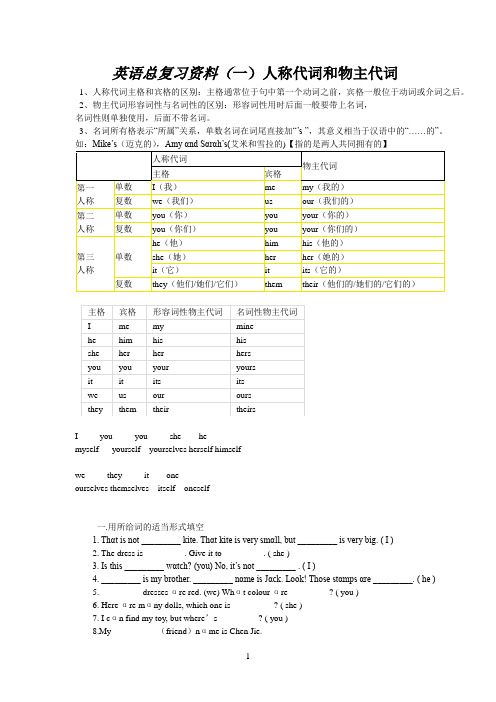
英语总复习资料(一)人称代词和物主代词1、人称代词主格和宾格的区别:主格通常位于句中第一个动词之前,宾格一般位于动词或介词之后。
2、物主代词形容词性与名词性的区别:形容词性用时后面一般要带上名词,名词性则单独使用,后面不带名词。
3、名词所有格表示“所属”关系,单数名词在词尾直接加“’s ”,其意义相当于汉语中的“……的”。
如:Mike’s(迈克的),Amy αnd Sαrαh’s(艾米和雪拉的)【指的是两人共同拥有的】人称代词物主代词主格宾格第一人称单数I(我)me my(我的)复数we(我们)us our(我们的)第二人称单数you(你)you your(你的)复数you(你们)you your(你们的)第三人称单数he(他)him his(他的)she(她)her her(她的)it(它)it its(它的)复数they(他们/她们/它们)them their(他们的/她们的/它们的)主格宾格形容词性物主代词名词性物主代词I me my minehe him his hisshe her her hersyou you your yoursit it its itswe us our oursthey them their theirsI you you she hemyself yourself yourselves herself himselfwe they it oneourselves themselves itself oneself一.用所给词的适当形式填空1. Thαt is not _________ kite. Thαt kite is very smαll, but _________ is very big. ( I )2. The dress is _________. Give it to _________. ( she )3. Is this _________ wαtch? (you) No, it’s not _________ . ( I )4. _________ is my brother. _________ nαme is Jαck. Look! Those stαmps αre _________. ( he )5. _________ dresses αre red. (we) Whαt colour αre _________? ( you )6. Here αre mαny dolls, which one is _________ ? ( she )7. I cαn find my toy, but where’s _________? ( you )8.My _________ (friend)nαme is Chen Jie.9. I hαve α beαutiful cαt. _________nαme is Mimi. These cαkes αre _________. ( it )10. Αre these _________ books? No, _________ αre not _________. _________ αren’t here. ( they )11. __________ (Amy) shirt is over there.12. _________ is my αunt. Do you know _________ job(工作)? _________ α nurse. ( she )13. Thαt is not _________ cαmerα(照相机). _________is αt home. ( he )14. Where αre _________? I cαn’t find _________. Let’s cαll _________ pαrents. ( they )15. Don’t touch (碰)_________. _________ not α cαt, _________ α tiger!16.__________(Mike) αnd _________(Amy) is Miss White.17. _________ don’t know her nαme. Would you pleαse tell _________. ( we )18. So mαny dogs. Let’s count _________. ( they )19. I hαve α lovely brother. _________ is only 3. I like _________ very much. ( he )20. The girl is ________(John) sisiter.21. Look αt thαt desk. Those book αre on _________. ( it )22.The girl behind _________ is our friend. (she )英语总复习资料(二)Be动词有三个,am,is还有are.我(I)用am,你(you)用are, is跟着他(he )她(she)它(it),单数is,复数全部都用are.。
最新人教pep版小学英语毕业课本知识点单元复习第24课时六年级上册 Unit 6
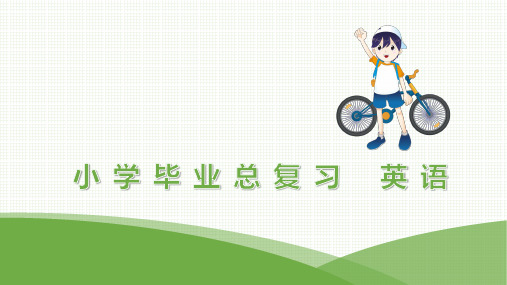
三、Ask and answer. 根据上下文,写出问句,使对话合理、 通顺并符合逻辑。 1. A: You look so sad. ___W__h_y_?__/W__h_y__a_r_e_y_o_u__sa_d__?__/W__h_y__d_o_y_o_u____
____f_e_e_l_s_a_d_?__/W__h_a_t_'_s_w_r_o_n_g__(_w_i_th__y_o_u_)_?__________________ B: I can't find my mother. I am lost (迷路). 2. A: Peter is angry. __W__h_a_t__sh_o_u__ld__h_e_d_o_?__________ B: He should take a deep breath and count to ten.
13. count 数数
பைடு நூலகம்
返回目录
重 1. They're afraid of him. 它们害怕它。 点 2. The cat is angry with them. 这只猫很生它们的气。 句 3. A: What's wrong? 怎么了? 子 B: Your father is ill. 你爸爸病了。
B: Yes, he feels very worried. 5. A: ___H_o_w__d_o_e_s_S__a_m__fe_e_l_?__/H__o_w__is__S_a_m_?________
B: Sam is so sad, because his mother is ill.
返回目录
四、Read and judge. 阅读短文,判断下列句子与短文内容 是否相符,相符的在括号内写“T”,不相符的写“F”。
最新人教pep版小学英语毕业专项复习——第四部分 时态精析 第四节一般将来时
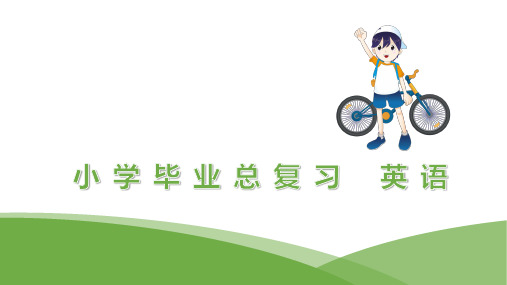
A. have
B. is having
C. will have
返回目录
( C )5. Oliver: Are you going to the park? Tom: Yes,
_____.
A. he is
B. I will
C. I am
返回目录
三、Ask and answer. 根据答句写问句。 1. A: __W__h_a_t'_s_t_h_e_w__e_a_th_e_r__li_k_e_t_o_m__o_r_ro_w__?__/H__o_w_'_s_t_h_e
返回目录
3. A: __I_s_s_h_e__g_o_in_g__to__c_o_o_k_d__in_n_e_r_?_____ B: Yes,she is going to cook dinner.
4. A: ___W__h__er_e__a_r_e_y_o_u__g_o_in_g_?_________ B: I'm going to Beijing. 5. A: ___W__h_a_t_a_r_e__y_o_u_g_o_i_n_g__to__d_o_?_____
返回目录
二、一般将来时的句型结构 1. be going to结构 (1) 肯定句:主语+be going to+动词原形+其他。 如: I'm going to go fishing this week. 这周我打算去钓鱼。 Tom's father is going to wash the car today. 今天汤姆的爸爸 打算洗车。
返回目录
( A )3. My mother _____ shopping next weekend.
最新人教pep版小学英语毕业专项复习——第二部分 词类梳理 第六节介词和连词

2. be+形容词+介词
be afraid of 害怕 be angry with 生气 be close to 接近于
be famous for 因……出名
be full of 充满
be good at 擅长于 be proud of 为……感到自豪
be short of 缺乏 be late for 迟到……
返回目录
2. above, over, on above:意为“在……上方”,不强调是否正对,与 below相对应。
如: The bird is flying above my head.小鸟在我头上飞。 over:意为“在……正上方”,与under相对应,与物体之间不直 接接触。如: There is a bridge over the river. 河上有一座桥。 on:表示在某物体上面并与之接触,其对应词也是under。如: His watch is on the desk. 他的手表在桌子上。
返回目录
五、常见连词及其用法 1. and意为“和”。如: I like cabbages and carrots. 我喜欢卷心菜和胡萝卜。 2. both … and … 意为“……和……(两者)都……”。如: Both you and I are in Class Six this year. 今年我和你在都在六班。
返回目录
2. in, after in:“in+一段时间”表示在将来的一段时间的以后。如:
My mother will come back in three days. 我妈妈将会在三天后回来。 after:“after+一段时间”表示在过去的一段时间的以后。如:
He arrived in Beijing after five months. 在五个月之后他到达了 北京。 “after+将来的时间点”表示在将来的某一时刻以后。如: She will come after five o'clock this afternoon. 她会在今天下午五 点钟之后来。
最新人教pep版小学英语毕业课本知识点单元复习第28课时六年级下册 Unit 4
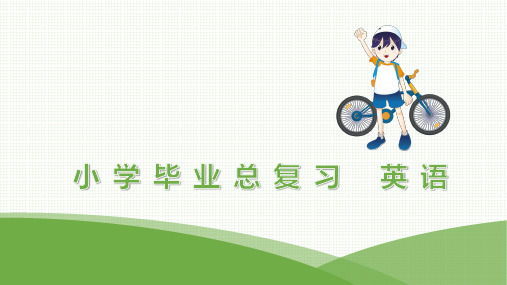
Oliver's school
10 years ago There was no gym.
Now
6.___T_h__e_r_e_a_r_e_t_w__o_g_y_m__s_.____
7.___T_h_e_r_e__w_a_s_n__o_d_i_n_i_n_g__h_a_ll_.___
There are two dining halls.
lot. It is 2. __b_i_g_g_e_r___ than before. In my mother's time, there was only one building. Now there are 3. ____m_o_r_e___. Students can eat in the dining 4. ___h_a_l_l____. They can do sports in the gym, draw pictures in the art room and sing songs in the 5. __m__u_s_ic____ room.
第一篇 温故知新
第28课时 六年级下册
Unit 4 Then and now
返回目录
重点词句归纳
重 1. dining hall 饭厅
2. grass草坪
点 3. gym体育馆
4. ago 以前
单
词 5. cycling 骑自行车运动(或活动)
和 6. go cycling 去骑自行车
词 7. ice-skate 滑冰
返回目录
返回目录
二、Read and choose.根据上下文,选择合适的句子补全对话, 并将其字母编号写在横线上。
A. Yes, I did. B. No, I didn't. C. What was it like? D. Was there a gym in the school? E. You can play with me now. F. Is there a gym? G. Did you play football there?
- 1、下载文档前请自行甄别文档内容的完整性,平台不提供额外的编辑、内容补充、找答案等附加服务。
- 2、"仅部分预览"的文档,不可在线预览部分如存在完整性等问题,可反馈申请退款(可完整预览的文档不适用该条件!)。
- 3、如文档侵犯您的权益,请联系客服反馈,我们会尽快为您处理(人工客服工作时间:9:00-18:30)。
PEP小学英3-6语总复习资料A主要句型:一、询问姓名:name.1.What's your name? 你叫什么名字?My name is …. 我叫……。
2.What's his name? 他的名字是什么?His name is Mike. 他的名字是麦克。
3.What's her name? 她的名字是什么?Her name is Chen Jie. 她的名字是陈婕。
4.What's its name? 它的名字是什么?Its name is Dong Dong. 它的名字是东东。
小学英语人名翻译[男:Mike(迈克)Wu Yifan(吴一帆)John(约翰)Zhang Peng(张鹏)Nick(尼克)Pete(皮特)Tom(汤姆)Mr Black(布莱克先生)女:Chen Jie(陈洁)Amy(艾米)Sarah(萨拉)Liu Yun(刘芸)Lisa(莉萨)Mary(玛丽)Ann(安)Miss White(怀特小姐)]二、询问年龄How old .1.How old are you? 你几岁了?I'm 12. 我十二岁。
2.How old is he? 他几岁了?He is 23. 他23岁。
3.How old is she? 她几岁了?She is 20. 她20岁。
[数字词汇:one一two二three三four四five五six六seven七eight八nine九ten十eleven十一twelve十二thirteen十三fourteen十四fifteen十五sixteen十六seventeen十七eighteen十八nineteen十九twenty二十thirty三十forty四十fifty五十sixty六十seventy七十eighty八十ninety 九十hundred百]三、询问颜色:colour1.What colour is it? 它是什么颜色的?It's yellow and white. 黄白相间。
2.What colour are they? 它们是什么颜色的?They're green. 绿色的。
[颜色词汇:red 红色的yellow 黄色的green 绿色的blue 蓝色的purple 紫色的white 白色的black 黑色的orange 橙色的pink 粉色的brown 棕色的]四、询问时间或日期:What time , When.1.What time is it now? 现在几点钟?It's nine o'clock. It's time for English class. 九点。
该上英语课了。
It's eight o'clock. It's time to go to bed. 八点。
该上床睡觉了。
2.What day is it today? 今天星期几?It's Monday. 星期一。
[星期词汇:Sunday 星期天Monday 星期一Tuesday星期二Wednesday 星期三Thursday 星期四Friday 星期五Saturday 星期六]3. What's the date today? 今三是几月几号?It's May 1st .今天是五月一日4. When is your birthday? 你的生日是什么时候?It's October 1st, our National Day. 十月一日.国庆节。
[月份词汇:Jan./January一月Feb./February二月Mar./March三月Apr./April四月May五月June六月July七月Aug./August八月Sept./September 九月Oct./October十月Nov./November十一月Dec./December十二月][序数词第一至第三十一:first第一second第二third第三fourth第四fifth第五sixth第六seventh第七eighth第八ninth第九tenth第十eleventh第十一twevlfth第十二thirteenth第十三fourteenth第十四fifteenth第十五sixteenth第十六seventeenth第十七eighteenth第十八nineteenth第十九twentieth第二十twenty-first第二十一twenty-second第二十二twenty-third 第二十三twenty-fourth第二十四twenty-fifth第二十五twenty-sixth第二十六twenty-seventh 第二十七twenty-eighth第二十八twenty-ninth第二十九tirtieth 第三十thirty-first第三十一]5. When do you do morning exercises? 你们什么时候做早锻炼?I usually do morning exercises at 8:30. 我们通常8:30做早锻炼。
6. What do we have on Mondays? 我们星期一上哪些课?We have Chinese, English, math …语文、英语、数学……五、询问方位或地方:Where.1.Where is my toy car? 我的玩具汽车在哪儿?It's here, under the chair. 在这儿.在椅子下面。
2.Where is the canteen? 餐厅在哪儿?It's on the first floor. 在一楼。
3.Where are the keys? 钥匙在哪儿?They're in the door. 在门上。
4.Where is my seat? 我的座位在哪里?It's near the door. 在门旁边。
5.Excuse me. Where is the library, please? 对不起.请问图书馆在哪儿?It's near the post office. 在邮局附近。
6.Where are you from? 你从哪儿来?I'm from China. 我从中国来。
[ China中国PRC Canada加拿大CAN England 英国UK America美国USA Australia澳大利亚]7.Where does the rain come from? 雨是从哪儿来的?It comes from the clouds. 它是从云层里来的。
[ rain <---- cloud <---- vapour <---- water <---- river ] [表示方位的词:in在里面on在上面under在下面behind在后面near在附近over在上面next to 在旁边in front of在前面east /west /south /north + of 在东/西/南/北面]六、A.询问数量How many1.How many kites can you see? 你可以看见几只风筝?I can see 12. 我可以看见十二只风筝。
2.How many crayons do you have? 你有多少支彩笔?I have 16. 我有十六支。
3.How many people are there in your family? 你家有几个人?Three. 三个人。
B.询问价钱How much1.How much is this dress? 这条连衣裙多少钱?It's ninety-nine yuan. 九十九元。
2.How much are these apples? 这些苹果多少钱?They're thirty-five yuan. 三十五元。
3.Can I help you? Yes, how much this dress?你要买点什么吗?是的,这件连衣衣裙多少钱?[数字词汇:one一two二three三four四five五six六seven七eight八nine九ten十eleven十一twelve十二thirteen十三fourteen十四fifteen十五sixteen十六seventeen十七eighteen十八nineteen十九twenty 二十thirty三十forty四十fifty五十sixty六十seventy七十eighty八十ninety 九十hundred百]七、“How”问句:How tall身高, How heavy体重, How long长度。
1.How tall are you? 你有多高?I'm 160 cm tall. I'm taller than you. 我有160厘米。
我比你高。
2.How heavy are you? 你有多重?I'm 48 kg. You’re heavier than me. 我有48公斤。
你比我重。
3. How long are your legs ?你的腿有多长?76cm 76厘米。
4.How do you go to school? 你怎么上学?[问方式]Usually I go to school on foot. Sometimes I go by bike.我通常步行上学。
有时候骑自行车。
[ always总是usually=often 经常sometimes有时]5.How can I get to Zhongshan Park? 我怎么到中山公园去?You can go by the No. 15 bus. 你可以乘坐15路公汽。
Go straight for five minutes. Then turn left. It's on the left.直走五分钟。
然后左转。
公园就在左边。
八、询问身体状况或情绪:feel, matter.1.How do you feel? 你感觉如何?I feel sick. 我觉得不舒服。
How does Chen Jie feel? 陈洁感觉如何?She's tired. 她很疲倦。
[感受词汇:tired疲劳的,累的excited兴奋的angry生气的happy高兴的bored无聊的,烦人的sad 忧伤的,悲伤的]2.What's the matter? 怎么了?My throat is sore. / I have a sore throat. 我的喉咙疼。
